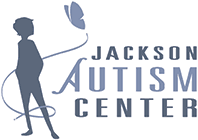I personally reached out to Meg and invited her to share with us because I was so impressed with her when I first met her in January and then again, when she was our guest at Jackson Autism Center, to speak about picky eating. She is a great resource and is currently accepting new families in Mississippi and North Carolina to work with. Make sure you check out her new website also! ~Dr. Becca
Getting the Most from OT
As a parent, sometimes occupational therapy can be confusing. What is it exactly? Sensory therapy? Fine motor? What’s a child’s occupation, anyway? To make matters even more confusing, what OT looks like from one therapist to another can be totally different! Here are some things to look for during OT no matter who your therapist is or where you see them.
- THEY SHOW YOU WHAT TO DO AT HOME
What might be happening. Let’s say you see your child’s OT in a sensory gym. You child loves playing on the swings and big exercise balls. He’s in a good mood for about an hour after therapy….and then everything goes back how it was. You wonder if this is really helping. But he likes it, so you keep going.
How to get more. Next time you go to the clinic you ask, “How can I use this at home?” The therapist mentions that your child is better at doing his homework after he swings for a bit. The two of you talk and decide that he can go to the park and swing after school before you go home to do homework.
- THEY LET YOU TRY
What might be happening. You go to therapy and either watch the therapist or wait in the waiting room to hear about what happened. You try to do the same thing the therapist did later at home, but it doesn’t work the same when you try it.
How to get more. Next time you go to therapy you ask, “Can I try that while you watch?” The therapist talks you through how you can help your child, and gives you feedback on what you can try differently when things don’t go well. When you get home, you feel confident that you know how to use the new strategies, and your child isn’t surprised when you try these new approaches at home. Your child makes progress so much faster because you are doing therapy all week rather than just for one hour.
- THEY WORK ON THINGS THAT MATTER TO YOU
What might be happening. You may not have gotten a chance to tell your therapist what your goals are for your child, or they may have changed since you started therapy. So your therapist helps her with some activities, but they aren’t the things you are really struggling with.
How to get more. An occupational therapist helps with a child’s daily occupations, meaning any activity they need and want to do. When you are having difficulty with your child’s daily activities like play, self-care, homework, or following a schedule, you ask your therapist to show you what you can do. They revise the plan of care to make sure they are addressing the most important goals for your child, or they refer you to someone who can help.
- THEY UNDERSTAND AUTISM
What might be happening. Therapy just isn’t working. You really like your therapist, but she doesn’t seem to get your child. Everyone is frustrated, and after months and months he isn’t making any progress.
How to get more. You ask your therapist for a referral to someone else. You have to try out a few different new therapists, but eventually you land on someone who works well with you and your child. Your therapist isn’t surprised or hurt by this, because all therapists know that even the best therapist is not the right fit for every child.
Choosing a new therapist? If you aren’t in occupational therapy, these scenarios can help guide you in choosing a therapist who will be a good fit. When talking to a potential new therapist, consider asking questions like:
“How will you help me learn what to do at home?”
“During therapy, can you teach me to use the strategies?”
“I’d like to work on x, y, z, is that something you can help with?”
It can feel uncomfortable at first, but everyone benefits when your child gets more out of his or her time in therapy!
See more tips on getting more from therapy at learnplaythrive.com
Meg Proctor is an occupational therapist and autism specialist. She offers online occupational therapy for families in Mississippi and North Carolina, and free ebooks and video tutorials for parents. You can find her at learnplaythrive.com.

